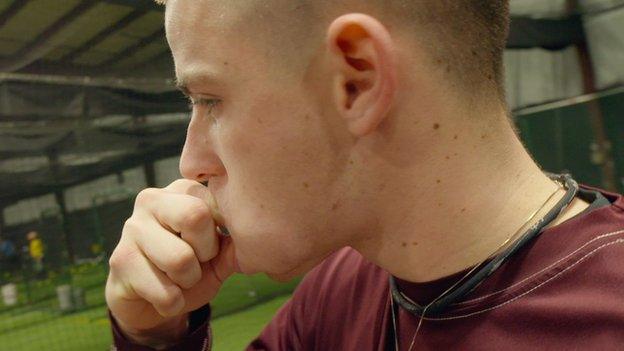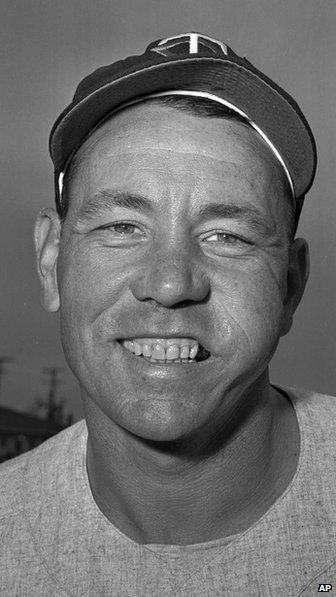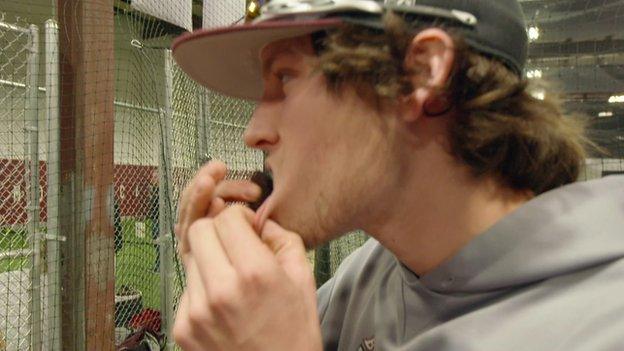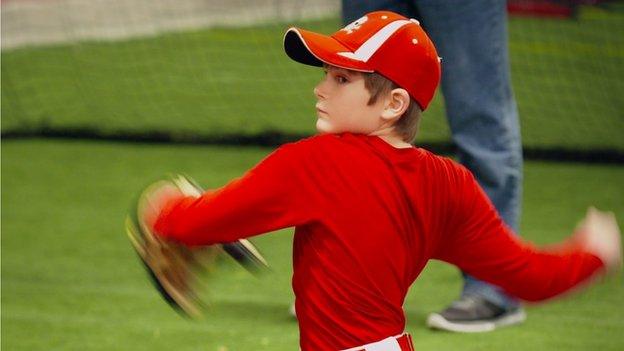Baseball's toxic tradition of chewing tobacco
- Published

Cheeks bulging with chewing tobacco are a common sight on the baseball pitch.
Once described as the nation's religion, baseball has a special place in American culture. But there is a darker side: the cancer-causing tradition of chewing tobacco, which has claimed the lives of some of its most celebrated players.
'Dip', 'chew', 'chaw' and 'baccer' are some of the names that refer to one baseball's oldest traditions - stuffing wads of tobacco into your lips or cheeks.
Almost every American baseball film depicts the habit - Tom Hanks spits out a mouthful in A League of Their Own, and the young players from The Sandlot Kids urge each other to dip because "all the pros do it."
It originally became popular with players to keep their mouths moist on the dry, dusty field during long games, while the tobacco spit helped soften their gloves.
In the early days the dangers of tobacco were not known, and the practice persisted through generations. But Babe Ruth and Bill Tuttle are just two of the baseball greats who lost their lives to cancers linked to chewing tobacco.

Star player Bill Tuttle was often pictured with a trademark bulge of tobacco in his cheek.
More recently Major League player Tony Gwynn developed salivary gland cancer. Its effects were devastating.
He was known for his laughter and broad smile, but cancer treatment took these from him by leaving his face temporarily paralysed on one side.
After several years of treatment he died in 2014 at the age of 54.
Although doctors say a link between his cancer and chewing tobacco cannot be proven, Gywnn himself blamed the cancer on the dipping habit he had had since his days as a rookie player.
His death led to renewed calls to rid the sport of chewing tobacco, which is restricted but not banned in Major League Baseball.
'More harmful than smoking'
There is little doubt that smokeless tobacco - the umbrella term that covers chewing tobacco and the more finely ground dipping tobacco - is a health hazard.
It contains 28 cancer causing agents, and more of the highly addictive drug nicotine than cigarettes.
To put it into perspective, an average sized dip kept in the mouth for 30 minutes, releases as much nicotine as smoking three cigarettes.
Dr Jatin Shah, who runs the Head and Neck Service at Memorial Sloan Kettering Cancer Center in New York, says chewing tobacco is "probably more harmful than smoking," because the tobacco carcinogens are in direct contact with the lining of the mouth.

Dip is held inside the lips or cheeks.
But while cigarette smoking has declined in recent years, dipping or chewing tobacco among teenagers has not.
According to the US Centers for Disease Control and Prevention, more than one in 10 high school boys (ages 14 to 17) use it.
There is laxer regulation of dipping tobacco compared to cigarettes.
Researchers from the Harvard School of Public Health have looked into how often baseball players dip on television.
They found that during one game of the 2004 World Series, players were visibly chewing tobacco for a total of nine minutes and 11 seconds - adding up, they said, to millions of dollars of free advertising for the tobacco industry.
Chewing tobacco has been linked to cancer deaths
'Part of the culture'
Curt Schilling is regarded as one of baseball's greatest pitchers, winner of three World Series titles - and another former user of chewing tobacco.
Today he considers himself lucky to be alive, after being diagnosed and treated for mouth cancer.
Like other major league players, Schilling was lectured about the risks of dipping, but it is so engrained in baseball culture, he says, that giving up is really hard.
He met many people who quit the habit only to take it up again at the start of the baseball season.
"To me it's very much like being an alcoholic and quitting, and having to work in a bar as a bartender."
And it's not just professional players who are putting themselves at risk.
Michael Hynes, an amateur baseball player, started dipping in high school where it was common amongst his friends.
"As soon as I step on a baseball field I just always put a dip in, just out of instinct. I've always seen Major League Baseball players do it and I always wanted to be like them."
He wasn't fooled by his parents' attempts to convince him those famous players were just chewing gum.
Calls for a ban
But baseball authorities are increasingly concerned about the image being sent to young players and fans.
Dip has been banned in the minor leagues - training grounds for the stars of the future - for over two decades, and Major League Baseball Commissioner Bud Selig says it should be banned in the majors too, where the practice is arguably more visible and influential.

There is concern about the effect on young player of seeing their heroes chewing tobacco.
At the moment Major League Baseball has certain restrictions, rather than an outright ban: since 2011, teams can no longer provide smokeless tobacco products to players, and players who dip can no longer carry it in their uniform pockets or use it during interviews.
Gary Shears, the commissioner and founder of the New Jersey Independent Baseball League, an amateur league, is a former dipper.
He understands that Major Leaguers are role models, but does not believe that a ban should be instituted.
"I don't think you should say you can't chew during the game. You can't really mandate someone to have a good habit or to value their health, that's just something that somebody has to do."
Many baseball players echo that sentiment, but health organisations continue to push for a full ban.
They worry that without it, chewing tobacco will continue to be baseball's deadliest tradition.
- Published11 January 2015
